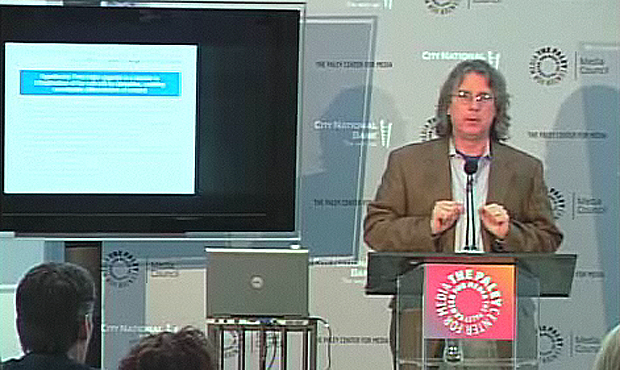
I like to think that I’ve watched enough video presentations given by self-proclaimed tech gurus predicting the “Next Big Thing” to be able to smell the bovine excrement from 100 paces.
It’s usually the same people that crop-up over and over again, prophesising that “..the way that we do (whatever) is dead! This new thing that’s coming along is going to sweep everything else away in a blink of an eye!” You know the sort.
However, I really can’t argue with the points made in a presentation that I recently found from Roger McNamee, MD and one of the founders of venture capital company Elevation Partners (who clearly need to get someone to redesign and update their website. Not only is the footer out of date, but the site uses Flash. Flash? Really ?).
McNamee’s been investing in tech companies for nearly 30 years, including names such as Facebook, Forbes and Yelp, so in my book here’s a guy who probably knows what he’s talking about in terms of the trends taking over the tech world.
I would love you to watch the whole video of his presentation. However the video’s been taken down, and a brief Google search (yes, I see the irony) didn’t reveal a new link. It’s a real shame, as I think McNamee’s position is prophetic. Here are some of the key takeaways from the presentation:
- Microsoft’s influence on the way that companies and individuals work with technology is becoming increasingly marginalized and – dare it be said – irrelevant. This is mainly due to the continued rise of mobile devices (smartphones and tablets) which has pushed companies to develop applications that either run inside web browsers, or are downloadable proprietary “apps” (such as those from Apple or Google). Microsoft’s share of internet-connected devices, has gone from 95% to under 50% in three years.
- Smartphones and tablets account for half of all internet-connected devices (we’re in a Post-PC era, remember) the very essence of the content that people consume must change. There is no-one out there today that does a good job of handling media experiences on devices such as the iPhone. The opportunity is to create the first media experiences that work.
- PCs are aggravating and expensive. For many corporate applications devices such as the iPad are better suited. Every desktop that gets eliminated saves around $1000 per year in software licensing and hardware support costs. If you’re a company with 100 or 10 000 computers, that’s a serious chunk of change that you’re saving.
- This notion of a monopoly’s marketshare falling below 50% is a recurring theme in technology. There are certain elements of technology that are natural monopolies, but they never last for long.
- Google is in a very difficult place, from a strategy perspective. It’s become too successful (McNamee calls the result of their success a “pollution” of their product) and has allowed niche search engines to grow. Companies like Yelp, realtor.com. or match.com have essentially built their businesses to address search problems that were handled poorly in Google. For example, if you want to do a search on business people you might use LinkedIn; while if you’re looking for facts you’ll probably do your search on Wikipedia. Together, all of these other niche search services add-up to more than 50% of all internet searches.
- HTML, the programming language of the web, has essentially been static over the past few years, which has allowed Google to commoditize everybody. Today we have HTML5, the first major upgrade in a decade, which will be disruptive and enable the monetizable differentiation of content. All of the rules are re-written. Every ad – or even every Tweet – can be an app. HTML is essentially a blank sheet of paper, and creativity rules again. Tomorrow’s war is between the open web (i.e. HTML5) and Apple’s “walled garden” approach.
ABOUT THE AUTHOR

Gee Ranasinha is CEO and founder of KEXINO. He's been a marketer since the days of 56K modems and AOL CDs, and lectures on marketing and behavioral economics at two European business schools. An international speaker at various conferences and events, Gee was noted as one of the top 100 global business influencers by sage.com (those wonderful people who make financial software).
Originally from London, today Gee lives in a world of his own in Strasbourg, France, tolerated by his wife and teenage son.
Find out more about Gee at kexino.com/gee-ranasinha. Follow him on on LinkedIn at linkedin.com/in/ranasinha or Instagram at instagram.com/wearekexino.
Recent articles:
How Behavioral Science Thinking Improves Marketing Effectiveness

Dark Social: The Hidden Conversations Marketers Can’t See

Marketing In A Recession: How To Weather The Storm

How To Convince A Marketing Skeptic

Privacy Protection: Why Ad Tracking Must End

Marketing Isn’t About Being Brave: It’s About Being Effective

